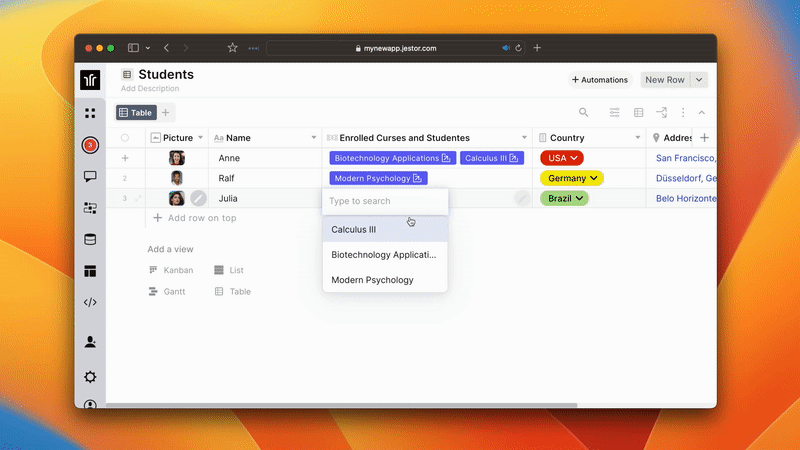Connected Table (N:M)
Add many to many relationships creating an intermediary table

What is the Connected Table (N:M) field?
It's a field that you can add many to many relationships creating an intermediary table
N:M Connections
Many to many connections should be used only when many elements could be linked to many others elements. It's not a usual scenario for business processes, and it's commonly mistaken with N:1 relationships.
In order to build this connection, a 3rd table is automatically created, managing the multiple relationship between both tables.

How to create a Connected Table (N:M) field
To create a Connected Table (N:M) field:
- On table mode, click on the last table header with a "+"or press (F).
- Just look for the "Connected Table (N:M)" option and click on it.
- Choose the name of your field, the table you're connecting to, and if it's a required field.
Filter the connected records
Scrolling down the connected record creation page, you'll find the option to filter the connected records. This way you can filter the connect table field to only show specific filtered information.
Common use cases
Connected records” field is very important and useful for creating a scalable database structure. It can be used to create a correlation between data in a way you can easily access information on the connected record, as well as having a summary of connections. This is useful for purchases, sales, documentation, projects, and many other different cases.:
For example:
- In a “Sales” flow, it can be created as a field to link the sales orders to the “Clients” table.
Another example:
- You can create a “Companies” table for storing leads and a “Contacts” table to register the contacts of these companies. Then you create a “Connect records” field in the “Contacts” table to associate each contact with a company.
Understanding processes and block based building.If you want to understand more about how to effectively use Connect tables field, we highly encourage reading on the Three Laws of Process Building: https://jestor.com/blog/jestor-process/pareidolia-to-process/
Updated 3 months ago
